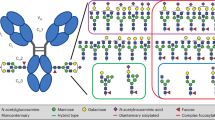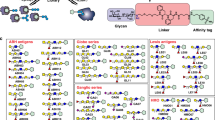Abstract
Carbohydrates have a great potential in generating structural and immunological diversities. Microbial pathogens often decorate their outmost surfaces with specific carbohydrate signatures. Carbohydrate antigens also differ significantly from protein antigens in physiochemical properties, especially in surface display of antigenic determinants in aqueous solutions. Technical optimization or modifications are often needed when we apply standard procedures for protein-based enzyme-linked immunosorbent assay (ELISA) to assess immunologically potent carbohydrates. We present here our laboratory protocols for performing carbohydrate ELISA and discuss several assay platforms that may be applied complementarily to explore the carbohydrate moieties that are critical for host immune recognition and induction of glycan-specific antibody responses.
Access this chapter
Tax calculation will be finalised at checkout
Purchases are for personal use only
Similar content being viewed by others
References
Wang D, Kabat EA (1996) Carbohydrate antigens (polysaccharides). In: Regenmortal MHVV (ed) Structure of antigens. CRC Press, Boca Raton/New York/London/Tokyo, pp 247–276
Wang D (2004) Carbohydrate antigens. In: Meyers RA (ed) Encyclopedia of molecular cell biology and molecular medicine, vol II. Wiley, Weinheim, pp 277–301
Wang D, Liu S, Trummer BJ, Deng C, Wang A (2002) Carbohydrate microarrays for the recognition of cross-reactive molecular markers of microbes and host cells. Nat Biotechnol 20(3):275–281. Epub 5 Mar 2002. https://doi.org/10.1038/nbt0302-275
Dochez AR, Avery OT (1917) The elaboration of specific soluble substance by pneumococcus during growth. J Exp Med 26:477–493
Heidelberger M, Avery OT (1923) The soluble specific substance of pneumococcus. J Exp Med 38:73–80
Mond JJ, Lees A, Snapper CM (1995) T cell-independent antigens type 2. Annu Rev Immunol 13:655–692
Ezzell JW Jr, Abshire TG, Little SF, Lidgerding BC, Brown C (1990) Identification of Bacillus anthracis by using monoclonal antibody to cell wall galactose-N-acetylglucosamine polysaccharide. J Clin Microbiol 28(2):223–231. Epub 1 Feb 1990. PubMed PMID: 2107201; PMCID: 269580
Wang D, Carroll GT, Turro NJ, Koberstein JT, Kovac P, Saksena R, Adamo R, Herzenberg LA, Herzenberg LA, Steinman L (2007) Photogenerated glycan arrays identify immunogenic sugar moieties of Bacillus anthracis exosporium. Proteomics 7(2):180–184
Schneerson R, Robbins JB, Barrera O, Sutton A, Habig WB, Hardegree MC, Chaimovich J (1980) Haemophilus influenzae type B polysaccharide-protein conjugates: model for a new generation of capsular polysaccharide vaccines. Prog Clin Biol Res 47:77–94. Epub 1 Jan 1980
Robbins JB, Schneerson R (1990) Polysaccharide-protein conjugates: a new generation of vaccines. J Infect Dis 161(5):821–832. Epub 1 May 1990
Lucas AH, Rittenhouse-Olson K, Kronenberg M, Apicella MA, Wang D, Schreiber JR, Taylor CE (2008) Carbohydrate moieties as vaccine candidates: meeting summary. Vaccine 28(4):1121–1131
Granoff DM, Maslanka SE, Carlone GM, Plikaytis BD, Santos GF, Mokatrin A, Raff HV (1998) A modified enzyme-linked immunosorbent assay for measurement of antibody responses to meningococcal C polysaccharide that correlate with bactericidal responses. Clin Diagn Lab Immunol 5(4):479–485. Epub 17 July 1998. PubMed PMID: 9665952; PMCID: PMC95603
Wernette CM, Frasch CE, Madore D, Carlone G, Goldblatt D, Plikaytis B, Benjamin W, Quataert SA, Hildreth S, Sikkema DJ, Kayhty H, Jonsdottir I, Nahm MH (2003) Enzyme-linked immunosorbent assay for quantitation of human antibodies to pneumococcal polysaccharides. Clin Diagn Lab Immunol 10(4):514–519. https://doi.org/10.1128/cdli.10.4.514-519.2003. Epub 11 July 2003. PubMed PMID: 12853378; PMCID: PMC164258
Inzana TJ, Champion A (2007) Use of an inhibition enzyme-linked immunosorbent assay for quantification of capsular polysaccharide or proteins in vaccines. Clin Vaccine Immunol 14(3):323–327. https://doi.org/10.1128/CVI.00302-06. Epub 3 Feb 2007. PubMed PMID: 17267591; PMCID: PMC1828856
Kok-Jacon GA, Vincken JP, Suurs LC, Wang D, Liu S, Visser RG (2005) Production of dextran in transgenic potato plants. Transgenic Res 14(4):385–395. Epub 6 Oct 2005. https://doi.org/10.1007/s11248-005-0439-0
Wang D, Dafik L, Nolley R, Huang W, Wolfinger RD, Wang LX, Peehl DM (2013) Anti-oligomannose antibodies as potential serum biomarkers of aggressive prostate cancer. Drug Dev Res 74(Biomarkers in drug development and companion diagnostics):65–80. https://doi.org/10.1002/ddr.21063
Acknowledgments
We acknowledge the Kabat Collection of Carbohydrate Antigens at SRI International for a panel of carbohydrate antigens and antibodies that were applied in this study. This work was supported in part by the US Government grants R21DA046144-02 (NIH), 1R21CA254048-01 (NIH), and PR170128 (CDMRP) to DW. The content is solely the responsibility of the author and does not necessarily represent the official views of the funding agents.
Author information
Authors and Affiliations
Corresponding author
Editor information
Editors and Affiliations
Rights and permissions
Copyright information
© 2023 The Author(s), under exclusive license to Springer Science+Business Media, LLC, part of Springer Nature
About this protocol
Cite this protocol
Wang, D. (2023). Assessment of Immunologically Potent Carbohydrates. In: Matson, R.S. (eds) ELISA. Methods in Molecular Biology, vol 2612. Humana, New York, NY. https://doi.org/10.1007/978-1-0716-2903-1_10
Download citation
DOI: https://doi.org/10.1007/978-1-0716-2903-1_10
Published:
Publisher Name: Humana, New York, NY
Print ISBN: 978-1-0716-2902-4
Online ISBN: 978-1-0716-2903-1
eBook Packages: Springer Protocols




